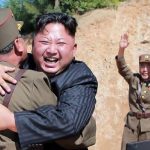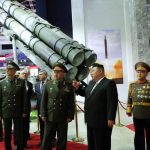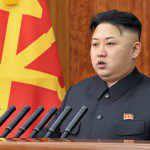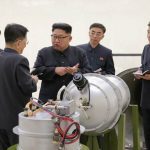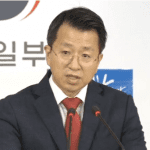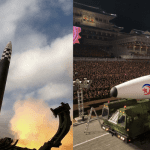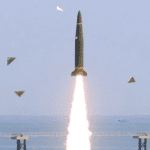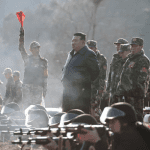A Russian delegation led by Defence Minister Sergei Shoigu has arrived in North Korea, to be joined by a Chinese delegation later.
They will attend Pyongyang’s celebrations of the 70th anniversary of the end of the Korean War, marked typically by massive military parades.
The visits are the first of their kind to the North since it shut its borders to try to keep out the pandemic.
It is unclear if this signals a change in Pyongyang’s border policies.
Reclusive North Korea had sealed itself off from all trade and diplomatic ties in early 2020, even with Russia and China, its main economic and political partners.
They even cut off imports of essential goods like food and medicine.
North Korea has been facing food shortages, which have been made worse by its border closure and strict international sanctions that have been imposed because of its nuclear programme.
Some analysts say the inclusion of Chinese and Russian envoys in this year’s “Victory Day” parade – as the 1953 Korean armistice is called in the North – hints at a possible loosening of Covid restrictions.
It comes weeks after images of North Koreans walking around without masks were shown on state media.
The Russian delegation arrived in North Korea late on Tuesday, and received a warm welcome on the tarmac at an airport in Pyongyang.
Mr Shoigu walked past a line of saluting soldiers and a red banner emblazoned with the words, “Welcome, Comrade Defence Minister of the Russian Federation Sergei Shoigu!” in both Korean and Russian.
The Chinese delegation will be led by Li Hongzhong, who is part of the Chinese Communist Party’s central policymaking committee, and will arrive some time on Wednesday, according to a party spokesperson.
China and Russia are both long time allies of North Korea.
Beijing had sent troops in the autumn of 1950 to support North Korea in the war against South Korea. The then Soviet Union also supported North Korea in the war.
Since the collapse of the USSR in 1991, Russia has remained a natural ally for North Korea because of their mutual dislike for the US. Washington has, in fact, accused North Korea of providing military aid to Russia in its war in Ukraine, a claim that both Pyongyang and Moscow deny.
Mr Shoigu’s visit also comes against the backdrop of rising geopolitical tensions between the US and Russia over the Ukraine war. Ties between Beijing and Washington are also frayed because of Taiwan.
The US has been trying to talk to Pyongyang after US soldier Travis King fled to North Korea last week.
Private King, who was meant to go back to the US to face disciplinary action, ran into North Korea while on a tour at the Joint Security Area (JSA), an area in the Demilitarised Zone (DMZ) that divides North and South Korea.
The United Nations Command, which the United States is part of, said on Monday that dialogue had taken place with North Korea over Pvt King, but did not provide any details.
A Russian delegation led by Defence Minister Sergei Shoigu has arrived in North Korea, to be joined by a Chinese delegation later.
They will attend Pyongyang’s celebrations of the 70th anniversary of the end of the Korean War, marked typically by massive military parades.
The visits are the first of their kind to the North since it shut its borders to try to keep out the pandemic.
It is unclear if this signals a change in Pyongyang’s border policies.
Reclusive North Korea had sealed itself off from all trade and diplomatic ties in early 2020, even with Russia and China, its main economic and political partners.
They even cut off imports of essential goods like food and medicine.
North Korea has been facing food shortages, which have been made worse by its border closure and strict international sanctions that have been imposed because of its nuclear programme.
Some analysts say the inclusion of Chinese and Russian envoys in this year’s “Victory Day” parade – as the 1953 Korean armistice is called in the North – hints at a possible loosening of Covid restrictions.
It comes weeks after images of North Koreans walking around without masks were shown on state media.
The Russian delegation arrived in North Korea late on Tuesday, and received a warm welcome on the tarmac at an airport in Pyongyang.
Mr Shoigu walked past a line of saluting soldiers and a red banner emblazoned with the words, “Welcome, Comrade Defence Minister of the Russian Federation Sergei Shoigu!” in both Korean and Russian.
The Chinese delegation will be led by Li Hongzhong, who is part of the Chinese Communist Party’s central policymaking committee, and will arrive some time on Wednesday, according to a party spokesperson.
China and Russia are both long time allies of North Korea.
Beijing had sent troops in the autumn of 1950 to support North Korea in the war against South Korea. The then Soviet Union also supported North Korea in the war.
Since the collapse of the USSR in 1991, Russia has remained a natural ally for North Korea because of their mutual dislike for the US. Washington has, in fact, accused North Korea of providing military aid to Russia in its war in Ukraine, a claim that both Pyongyang and Moscow deny.
Mr Shoigu’s visit also comes against the backdrop of rising geopolitical tensions between the US and Russia over the Ukraine war. Ties between Beijing and Washington are also frayed because of Taiwan.
The US has been trying to talk to Pyongyang after US soldier Travis King fled to North Korea last week.
Private King, who was meant to go back to the US to face disciplinary action, ran into North Korea while on a tour at the Joint Security Area (JSA), an area in the Demilitarised Zone (DMZ) that divides North and South Korea.
The United Nations Command, which the United States is part of, said on Monday that dialogue had taken place with North Korea over Pvt King, but did not provide any details.
A Russian delegation led by Defence Minister Sergei Shoigu has arrived in North Korea, to be joined by a Chinese delegation later.
They will attend Pyongyang’s celebrations of the 70th anniversary of the end of the Korean War, marked typically by massive military parades.
The visits are the first of their kind to the North since it shut its borders to try to keep out the pandemic.
It is unclear if this signals a change in Pyongyang’s border policies.
Reclusive North Korea had sealed itself off from all trade and diplomatic ties in early 2020, even with Russia and China, its main economic and political partners.
They even cut off imports of essential goods like food and medicine.
North Korea has been facing food shortages, which have been made worse by its border closure and strict international sanctions that have been imposed because of its nuclear programme.
Some analysts say the inclusion of Chinese and Russian envoys in this year’s “Victory Day” parade – as the 1953 Korean armistice is called in the North – hints at a possible loosening of Covid restrictions.
It comes weeks after images of North Koreans walking around without masks were shown on state media.
The Russian delegation arrived in North Korea late on Tuesday, and received a warm welcome on the tarmac at an airport in Pyongyang.
Mr Shoigu walked past a line of saluting soldiers and a red banner emblazoned with the words, “Welcome, Comrade Defence Minister of the Russian Federation Sergei Shoigu!” in both Korean and Russian.
The Chinese delegation will be led by Li Hongzhong, who is part of the Chinese Communist Party’s central policymaking committee, and will arrive some time on Wednesday, according to a party spokesperson.
China and Russia are both long time allies of North Korea.
Beijing had sent troops in the autumn of 1950 to support North Korea in the war against South Korea. The then Soviet Union also supported North Korea in the war.
Since the collapse of the USSR in 1991, Russia has remained a natural ally for North Korea because of their mutual dislike for the US. Washington has, in fact, accused North Korea of providing military aid to Russia in its war in Ukraine, a claim that both Pyongyang and Moscow deny.
Mr Shoigu’s visit also comes against the backdrop of rising geopolitical tensions between the US and Russia over the Ukraine war. Ties between Beijing and Washington are also frayed because of Taiwan.
The US has been trying to talk to Pyongyang after US soldier Travis King fled to North Korea last week.
Private King, who was meant to go back to the US to face disciplinary action, ran into North Korea while on a tour at the Joint Security Area (JSA), an area in the Demilitarised Zone (DMZ) that divides North and South Korea.
The United Nations Command, which the United States is part of, said on Monday that dialogue had taken place with North Korea over Pvt King, but did not provide any details.
A Russian delegation led by Defence Minister Sergei Shoigu has arrived in North Korea, to be joined by a Chinese delegation later.
They will attend Pyongyang’s celebrations of the 70th anniversary of the end of the Korean War, marked typically by massive military parades.
The visits are the first of their kind to the North since it shut its borders to try to keep out the pandemic.
It is unclear if this signals a change in Pyongyang’s border policies.
Reclusive North Korea had sealed itself off from all trade and diplomatic ties in early 2020, even with Russia and China, its main economic and political partners.
They even cut off imports of essential goods like food and medicine.
North Korea has been facing food shortages, which have been made worse by its border closure and strict international sanctions that have been imposed because of its nuclear programme.
Some analysts say the inclusion of Chinese and Russian envoys in this year’s “Victory Day” parade – as the 1953 Korean armistice is called in the North – hints at a possible loosening of Covid restrictions.
It comes weeks after images of North Koreans walking around without masks were shown on state media.
The Russian delegation arrived in North Korea late on Tuesday, and received a warm welcome on the tarmac at an airport in Pyongyang.
Mr Shoigu walked past a line of saluting soldiers and a red banner emblazoned with the words, “Welcome, Comrade Defence Minister of the Russian Federation Sergei Shoigu!” in both Korean and Russian.
The Chinese delegation will be led by Li Hongzhong, who is part of the Chinese Communist Party’s central policymaking committee, and will arrive some time on Wednesday, according to a party spokesperson.
China and Russia are both long time allies of North Korea.
Beijing had sent troops in the autumn of 1950 to support North Korea in the war against South Korea. The then Soviet Union also supported North Korea in the war.
Since the collapse of the USSR in 1991, Russia has remained a natural ally for North Korea because of their mutual dislike for the US. Washington has, in fact, accused North Korea of providing military aid to Russia in its war in Ukraine, a claim that both Pyongyang and Moscow deny.
Mr Shoigu’s visit also comes against the backdrop of rising geopolitical tensions between the US and Russia over the Ukraine war. Ties between Beijing and Washington are also frayed because of Taiwan.
The US has been trying to talk to Pyongyang after US soldier Travis King fled to North Korea last week.
Private King, who was meant to go back to the US to face disciplinary action, ran into North Korea while on a tour at the Joint Security Area (JSA), an area in the Demilitarised Zone (DMZ) that divides North and South Korea.
The United Nations Command, which the United States is part of, said on Monday that dialogue had taken place with North Korea over Pvt King, but did not provide any details.
A Russian delegation led by Defence Minister Sergei Shoigu has arrived in North Korea, to be joined by a Chinese delegation later.
They will attend Pyongyang’s celebrations of the 70th anniversary of the end of the Korean War, marked typically by massive military parades.
The visits are the first of their kind to the North since it shut its borders to try to keep out the pandemic.
It is unclear if this signals a change in Pyongyang’s border policies.
Reclusive North Korea had sealed itself off from all trade and diplomatic ties in early 2020, even with Russia and China, its main economic and political partners.
They even cut off imports of essential goods like food and medicine.
North Korea has been facing food shortages, which have been made worse by its border closure and strict international sanctions that have been imposed because of its nuclear programme.
Some analysts say the inclusion of Chinese and Russian envoys in this year’s “Victory Day” parade – as the 1953 Korean armistice is called in the North – hints at a possible loosening of Covid restrictions.
It comes weeks after images of North Koreans walking around without masks were shown on state media.
The Russian delegation arrived in North Korea late on Tuesday, and received a warm welcome on the tarmac at an airport in Pyongyang.
Mr Shoigu walked past a line of saluting soldiers and a red banner emblazoned with the words, “Welcome, Comrade Defence Minister of the Russian Federation Sergei Shoigu!” in both Korean and Russian.
The Chinese delegation will be led by Li Hongzhong, who is part of the Chinese Communist Party’s central policymaking committee, and will arrive some time on Wednesday, according to a party spokesperson.
China and Russia are both long time allies of North Korea.
Beijing had sent troops in the autumn of 1950 to support North Korea in the war against South Korea. The then Soviet Union also supported North Korea in the war.
Since the collapse of the USSR in 1991, Russia has remained a natural ally for North Korea because of their mutual dislike for the US. Washington has, in fact, accused North Korea of providing military aid to Russia in its war in Ukraine, a claim that both Pyongyang and Moscow deny.
Mr Shoigu’s visit also comes against the backdrop of rising geopolitical tensions between the US and Russia over the Ukraine war. Ties between Beijing and Washington are also frayed because of Taiwan.
The US has been trying to talk to Pyongyang after US soldier Travis King fled to North Korea last week.
Private King, who was meant to go back to the US to face disciplinary action, ran into North Korea while on a tour at the Joint Security Area (JSA), an area in the Demilitarised Zone (DMZ) that divides North and South Korea.
The United Nations Command, which the United States is part of, said on Monday that dialogue had taken place with North Korea over Pvt King, but did not provide any details.
A Russian delegation led by Defence Minister Sergei Shoigu has arrived in North Korea, to be joined by a Chinese delegation later.
They will attend Pyongyang’s celebrations of the 70th anniversary of the end of the Korean War, marked typically by massive military parades.
The visits are the first of their kind to the North since it shut its borders to try to keep out the pandemic.
It is unclear if this signals a change in Pyongyang’s border policies.
Reclusive North Korea had sealed itself off from all trade and diplomatic ties in early 2020, even with Russia and China, its main economic and political partners.
They even cut off imports of essential goods like food and medicine.
North Korea has been facing food shortages, which have been made worse by its border closure and strict international sanctions that have been imposed because of its nuclear programme.
Some analysts say the inclusion of Chinese and Russian envoys in this year’s “Victory Day” parade – as the 1953 Korean armistice is called in the North – hints at a possible loosening of Covid restrictions.
It comes weeks after images of North Koreans walking around without masks were shown on state media.
The Russian delegation arrived in North Korea late on Tuesday, and received a warm welcome on the tarmac at an airport in Pyongyang.
Mr Shoigu walked past a line of saluting soldiers and a red banner emblazoned with the words, “Welcome, Comrade Defence Minister of the Russian Federation Sergei Shoigu!” in both Korean and Russian.
The Chinese delegation will be led by Li Hongzhong, who is part of the Chinese Communist Party’s central policymaking committee, and will arrive some time on Wednesday, according to a party spokesperson.
China and Russia are both long time allies of North Korea.
Beijing had sent troops in the autumn of 1950 to support North Korea in the war against South Korea. The then Soviet Union also supported North Korea in the war.
Since the collapse of the USSR in 1991, Russia has remained a natural ally for North Korea because of their mutual dislike for the US. Washington has, in fact, accused North Korea of providing military aid to Russia in its war in Ukraine, a claim that both Pyongyang and Moscow deny.
Mr Shoigu’s visit also comes against the backdrop of rising geopolitical tensions between the US and Russia over the Ukraine war. Ties between Beijing and Washington are also frayed because of Taiwan.
The US has been trying to talk to Pyongyang after US soldier Travis King fled to North Korea last week.
Private King, who was meant to go back to the US to face disciplinary action, ran into North Korea while on a tour at the Joint Security Area (JSA), an area in the Demilitarised Zone (DMZ) that divides North and South Korea.
The United Nations Command, which the United States is part of, said on Monday that dialogue had taken place with North Korea over Pvt King, but did not provide any details.
A Russian delegation led by Defence Minister Sergei Shoigu has arrived in North Korea, to be joined by a Chinese delegation later.
They will attend Pyongyang’s celebrations of the 70th anniversary of the end of the Korean War, marked typically by massive military parades.
The visits are the first of their kind to the North since it shut its borders to try to keep out the pandemic.
It is unclear if this signals a change in Pyongyang’s border policies.
Reclusive North Korea had sealed itself off from all trade and diplomatic ties in early 2020, even with Russia and China, its main economic and political partners.
They even cut off imports of essential goods like food and medicine.
North Korea has been facing food shortages, which have been made worse by its border closure and strict international sanctions that have been imposed because of its nuclear programme.
Some analysts say the inclusion of Chinese and Russian envoys in this year’s “Victory Day” parade – as the 1953 Korean armistice is called in the North – hints at a possible loosening of Covid restrictions.
It comes weeks after images of North Koreans walking around without masks were shown on state media.
The Russian delegation arrived in North Korea late on Tuesday, and received a warm welcome on the tarmac at an airport in Pyongyang.
Mr Shoigu walked past a line of saluting soldiers and a red banner emblazoned with the words, “Welcome, Comrade Defence Minister of the Russian Federation Sergei Shoigu!” in both Korean and Russian.
The Chinese delegation will be led by Li Hongzhong, who is part of the Chinese Communist Party’s central policymaking committee, and will arrive some time on Wednesday, according to a party spokesperson.
China and Russia are both long time allies of North Korea.
Beijing had sent troops in the autumn of 1950 to support North Korea in the war against South Korea. The then Soviet Union also supported North Korea in the war.
Since the collapse of the USSR in 1991, Russia has remained a natural ally for North Korea because of their mutual dislike for the US. Washington has, in fact, accused North Korea of providing military aid to Russia in its war in Ukraine, a claim that both Pyongyang and Moscow deny.
Mr Shoigu’s visit also comes against the backdrop of rising geopolitical tensions between the US and Russia over the Ukraine war. Ties between Beijing and Washington are also frayed because of Taiwan.
The US has been trying to talk to Pyongyang after US soldier Travis King fled to North Korea last week.
Private King, who was meant to go back to the US to face disciplinary action, ran into North Korea while on a tour at the Joint Security Area (JSA), an area in the Demilitarised Zone (DMZ) that divides North and South Korea.
The United Nations Command, which the United States is part of, said on Monday that dialogue had taken place with North Korea over Pvt King, but did not provide any details.
A Russian delegation led by Defence Minister Sergei Shoigu has arrived in North Korea, to be joined by a Chinese delegation later.
They will attend Pyongyang’s celebrations of the 70th anniversary of the end of the Korean War, marked typically by massive military parades.
The visits are the first of their kind to the North since it shut its borders to try to keep out the pandemic.
It is unclear if this signals a change in Pyongyang’s border policies.
Reclusive North Korea had sealed itself off from all trade and diplomatic ties in early 2020, even with Russia and China, its main economic and political partners.
They even cut off imports of essential goods like food and medicine.
North Korea has been facing food shortages, which have been made worse by its border closure and strict international sanctions that have been imposed because of its nuclear programme.
Some analysts say the inclusion of Chinese and Russian envoys in this year’s “Victory Day” parade – as the 1953 Korean armistice is called in the North – hints at a possible loosening of Covid restrictions.
It comes weeks after images of North Koreans walking around without masks were shown on state media.
The Russian delegation arrived in North Korea late on Tuesday, and received a warm welcome on the tarmac at an airport in Pyongyang.
Mr Shoigu walked past a line of saluting soldiers and a red banner emblazoned with the words, “Welcome, Comrade Defence Minister of the Russian Federation Sergei Shoigu!” in both Korean and Russian.
The Chinese delegation will be led by Li Hongzhong, who is part of the Chinese Communist Party’s central policymaking committee, and will arrive some time on Wednesday, according to a party spokesperson.
China and Russia are both long time allies of North Korea.
Beijing had sent troops in the autumn of 1950 to support North Korea in the war against South Korea. The then Soviet Union also supported North Korea in the war.
Since the collapse of the USSR in 1991, Russia has remained a natural ally for North Korea because of their mutual dislike for the US. Washington has, in fact, accused North Korea of providing military aid to Russia in its war in Ukraine, a claim that both Pyongyang and Moscow deny.
Mr Shoigu’s visit also comes against the backdrop of rising geopolitical tensions between the US and Russia over the Ukraine war. Ties between Beijing and Washington are also frayed because of Taiwan.
The US has been trying to talk to Pyongyang after US soldier Travis King fled to North Korea last week.
Private King, who was meant to go back to the US to face disciplinary action, ran into North Korea while on a tour at the Joint Security Area (JSA), an area in the Demilitarised Zone (DMZ) that divides North and South Korea.
The United Nations Command, which the United States is part of, said on Monday that dialogue had taken place with North Korea over Pvt King, but did not provide any details.



